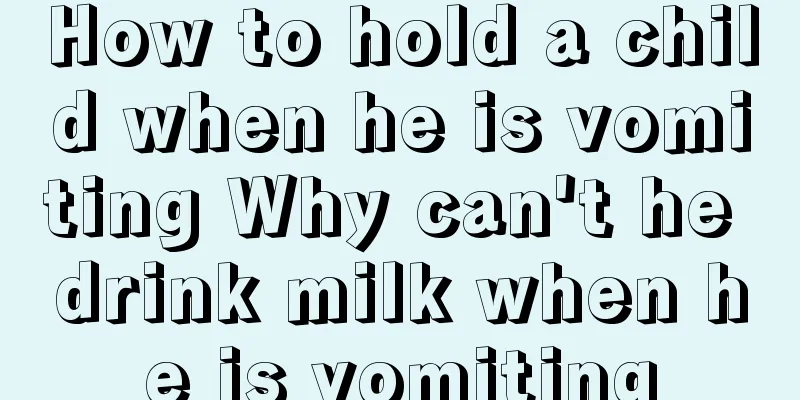How to replenish water for a dehydrated baby? What to do if a baby is dehydrated?

|
How to replenish water for babies who are dehydrated? Many babies with diarrhea will become dehydrated, so timely replenishing water for babies is an important step. However, excessive drinking of boiled water when babies are dehydrated can easily cause water poisoning. So how should we replenish water scientifically? How to replenish water for dehydrated babiesGenerally speaking, dehydration will cause dry skin and mucous membranes, decreased urine output, and other symptoms. If the urine output is similar to or even higher than usual, but the infant is still listless, lethargic, or has convulsions, then this may be a sign of water intoxication. To avoid excessive water intake, doctors recommend that the amount of water intake should be calculated based on body weight. For infants under 10 kg, 100 ml per kg is sufficient, and for those over 10 kg, 50 ml per kg is sufficient. What to do if your baby is dehydratedGenerally speaking, dehydration will cause dry skin and mucous membranes, decreased urine output, and other symptoms. If the urine output is similar to or even higher than usual, but the infant is still listless, lethargic, or has convulsions, then this may be a sign of water intoxication. To avoid excessive water intake, doctors recommend that the amount of water intake should be calculated based on body weight. For infants under 10 kg, 100 ml per kg is sufficient, and for those over 10 kg, 50 ml per kg is sufficient. Recently, more and more babies have diarrhea. Diarrhea can easily cause the loss of water and electrolytes in the baby's body. If not replenished in time, it can easily cause dehydration shock, and even circulatory failure, which is dangerous. Therefore, parents should feed the baby oral rehydration salts containing multiple electrolytes and glucose in time. It is ideal to replenish the water and salt lost through diarrhea and vomiting by washing with water the oral rehydration salts containing sodium, potassium and glucose. Previously, the oral rehydration salts produced domestically were called Type I and Type II, which are hyperosmotic types. Improper supplementation can cause hyperosmotic dehydration. Now you can choose the hypotonic type, that is, Type III oral rehydration salts. A simple way to replenish water and prevent dehydration is to add a certain amount of water prepared with hypotonic type III oral rehydration salts to the baby after each loose stool until the diarrhea stops. For babies under 6 months old, add 50ml after each diarrhea; for children from 6 months to 2 years old, add 100ml each time; for children 2-10 years old, add 150ml; for children over 10 years old, give as much as they can drink to effectively prevent dehydration. For babies who have already become dehydrated, the amount of supplementation should be larger. Babies who have already become dehydrated can still use III oral rehydration salts to treat mild and moderate dehydration. Here is a simple formula: liquid dosage (ml) = body weight (kg) X (50-75ml), which should be taken within 4 hours. For mild dehydration, choose 50ml, and for moderate dehydration, choose 75ml. These are not suitable for babies who are dehydrated.Boiled water. If your baby only drinks boiled water or purified water to replenish water during diarrhea, it will not only be difficult to absorb, but it will also easily lead to water poisoning and cause edema in the baby. Warm water with sugar. Try not to give your baby water with sugar during diarrhea, including soda, sports drinks, jelly water, and undiluted fruit juice. Because it contains sugar, the sugar will absorb water in the body into the intestines, which will aggravate the baby's dehydration and diarrhea. Sports drinks. Various sports drinks sold on the market emphasize that they are rich in electrolytes and can quickly replenish the body's lost water. This is usually a statement made by the manufacturer. In fact, sports drinks have a relatively high osmotic pressure. If you drink this kind of drink when you have severe diarrhea, it will make the diarrhea worse. |
Recommend
Is it good to hold your child to urinate? Four major hazards of holding your child to urinate
First, it causes frequent urination. Frequent uri...
How to judge the condition of female qi and blood, what are the signs
Qi and blood are very important life conditions f...
Will taking birth control pills cause breast pain? What should I do if taking birth control pills causes breast pain?
Birth control pills are a common contraceptive me...
What should I do if my baby has a fever and vomits? What should I do if my baby has strabismus?
The baby's body resistance is weak and the ph...
How to wash your baby's hair in winter? Pay attention to the water temperature
Winter is coming. Adults find it very difficult t...
Will taking folic acid affect ovulation? Will taking folic acid affect ovulation?
Girls are always very sensitive when preparing fo...
Can a one-year-old baby eat fennel? Benefits of eating fennel for babies
Everyone knows about fennel, which is generally u...
How to improve your baby's learning concentration
Sometimes you need some skills to improve your ch...
Why do children not eat? Tips to stimulate children's appetite
It is normal for children to be naughty and hyper...
Should baby eczema be kept dry or moist? How many months will it take for baby eczema to stop growing?
Baby eczema is also a common skin problem. Most o...
What are the symptoms of postpartum urinary incontinence? What is the best treatment for postpartum urinary incontinence?
Postpartum urinary incontinence is a very embarra...
What should I do if my milk is swollen during weaning? When is the best time to wean?
Weaning is a very tricky thing for both mothers a...
Will a baby become ugly if he sleeps with his mouth open? The harm of a baby sleeping with his mouth open
It is a very simple thing for a baby to sleep. Ho...
The correct way to use Kao softener. Which Kao softener smells good?
Putting some softener in the laundry can make the...
Will my mother's myopia be passed on to her children? Will my mother's myopia be passed on to her children?
Will myopia be inherited by the mother? Today, I ...









